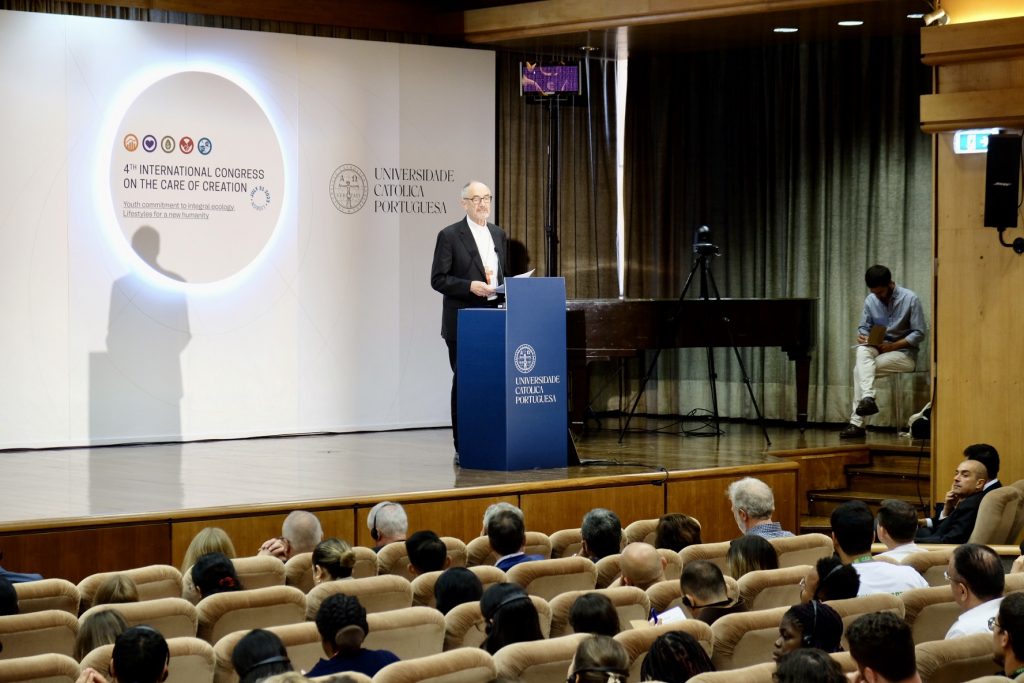
The Prefect of the Dicastery for Promoting Integral Human Development participated in the 4th International Conference on the Care of Creation, held this Monday at the Universidade Católica Portuguesa as part of WYD.
As part of the World Youth Day celebration, which begins tomorrow, August 1, in Lisbon, Laudato Si’ Movement organized the 4th International Conference on the Care of Creation at the Universidade Católica Portuguesa. The event was conceived as a meeting between the youth and experts, who this Monday will offer their reflections on the current climate reality and how to be protagonists in the care for our Common Home.
The conference was inaugurated by Cardinal Michael Czerny, Prefect of the Holy See’s Dicastery for Promoting Integral Human Development, who reflected, in light of the encyclical Laudato Si’, on the commitment of young people to integral ecology, as well as the lifestyles required “for a new humanity”. “It is a theme with a surprisingly prophetic tone,” said Czerny, “because it relates directly to the turning point in history: these times that are called the anthropocene.”
In this way, the cardinal explained that the Anthropocene “is a new geological epoch that names an astonishing turning point in the history of our planet,” since “never before has homo sapiens lived in such an era”, in which, “in an overwhelming way,” humans “have significantly altered all the earth’s systems: the atmosphere, the oceans, the continents and ecosystems, the entire community of life on earth.” And, as a consequence, “we are now experiencing disturbing trends: the ice is disappearing, the oceans are warmer and more acidic, sea levels are rising, there is extreme weather leading to droughts, floods and catastrophic events such as wildfires.”
“Human activity that causes greenhouse gas emissions is the cause of excessive heat,” Czerny continued, stressing that, for this reason, “more than 90 countries have already signed the Paris Agreements and have set targets to achieve net zero emissions by mid-century.” However, “what is being done is not enough and the results fall short of the target. So things will worsen.”
Therefore, with Laudato Si’, as the cardinal pointed out, “the Pope helps us to think about this humanly, spiritually and theologically,” since, in the encyclical, Francis “reformulates the Church’s teaching on Creation, on the natural environment that is our sole cradle of organic life, by highlighting the overlooked fact that humans are an integral part of the Earth ‘s system and are now collectively shaping its future,” and invites “the world to urgently engage in an honest dialogue about how we will build the planet’s future.”
“In these unprecedented times,” he said, “the Gospel calls us to change the way we live, act and pray.” Moreover, Czerny pointed out that “these times are so in need of new meanings, fresh values and, above all, living examples of people, communities and institutions that embody a new humanity.”
Nine concrete actions
To achieve net-zero emissions, Czerny pointed out that “rapid transformation is needed in all global systems: how we power our economies, how we transport people and goods, and how we feed a growing and aging population”. To this end, he acknowledges that “many important actions are needed to make the transition sustainable.” And, in this sense, he pointed out some of the major changes needed:
- ACHIEVE ZERO EMISSIONS BY MID-CENTURY: means a serious and rapid transition from a fossil fuel economy to a clean energy economy worldwide.
- PROTECTED FORESTS AND HABITATS: Stop deforestation, especially in globally important watersheds such as the Amazon and Congo; plant trees to increase land greening and a lower carbon footprint.
- PROTECT BIODIVERSITY AND HABITATS and halt ecosystem degradation. Many countries are calling for the protection of 30% of terrestrial and marine environments by 2030. The 30/30 target is considered a minimum.
- CITIES. They are now home to more than 57% of the world’s population, occupying 3% of the earth, but are responsible for most of the world’s energy consumption and greenhouse gas emissions. People-friendly cities require more public transport, more walking and “natural” cycling.
- TRANSPORTATION: A rapid shift to far fewer private cars and greener fuels for all modes of transportation.
- AGRICULTURE. It needs to regenerate and produce nutritious food in a way that restores soil health, reduces its carbon footprint and protects the climate, water resources and biodiversity.
- ECONOMY AND FINANCE. The frantic pursuit of profit that ignores the common good in nature and society must give way to responsible economics and finance.
- EDUCATION: Both educators and learners engaged in environmental education must be able to help themselves and all “grow in solidarity, responsibility and compassionate care” (LS 210) within the larger web of life.
Integral ecology for all
Czerny ended his address by recalling that, “religious or not, we can agree today that the earth is a shared inheritance, whose fruits are destined to benefit everyone today and tomorrow.” “For believers, this becomes a question of fidelity to the Creator, since God created the world for everyone.” Consequently, “it is not in accordance with God’s plan for this gift to be used in such a way that its benefits favor only a few. This calls into serious question the unjust habits of a part of humanity.” “Hence,” he stressed, “any ecological approach needs to incorporate a social perspective that takes into account the fundamental rights of the poor and disadvantaged.”





